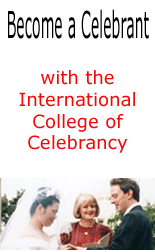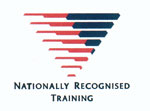So - What is a Celebrant Anyway?
by Dally Messenger
(Writer's Note: This article was originally written for, and published in, the first edition of the Celebrant USA Foundation Newsletter - 2002 during my teaching of the original students there.)
So - what can you do when you feel deeply, or even passionately, about wanting a ceremony in your life which really reflects you and your values?
So - what can you do when certain music, poetry, prose, stories, choreography or symbolism means a great deal to you and you want it done, or expressed, or on display, or sung in your wedding, your child's naming , or you father's funeral?
So - what happens when a Jew wants to marry a Catholic, or an atheist dies, or a child is born to two agnostics?
Answer: you get a celebrant. This is not to say that there are not many clergy in the community who will not oblige you & be unbelievably helpful. A celebrant, however, does not come from any standpoint of belief or unbelief.
A trained celebrant operates individually and professionally on the principle :The beliefs and values of the celebrant, if any, are irrelevant. When I, as a celebrant, am asked by my clients what do I believe religiously, or politically, or any other way, I simply tell them I would rather not say, because it may inhibit their freedom of choice.
I wish I had the space to tell you the many stories of the many different ceremonies, in which I have had the privilege to participate, but there is not enough of that space. Allow me, however, to list a few principles on which a trained celebrant operates.
A Summary:
1. A celebrant is a ceremony provider or officiant.
2. A celebrant undergoes a course of study in the art of creating and delivering ceremonies. A celebrant is therefore a qualified professional.
3. A celebrant believes in the power of ceremony. A celebrant therefore pursues excellence and quality in every ceremony.
4. A celebrant is a community person and is therefore not aligned with any particular group in any community.
5. A celebrant creates a ceremony according to the wishes and values of the client. All choices – celebrant, place, music, poetry, prose, and symbolism etc - are chosen or approved by the client.
6. A celebrant is particularly suitable for secular, inter-denominational, interfaith, non-denominational, or spiritual people. A celebrant is also suitable for people whom the churches cannot oblige e.g. divorced catholics.
7. A celebrant is a resource person and advisor who can assist people find what best expresses the values and ideals of the client.
8. A celebrant never does the same ceremony twice. Each ceremony is totally personal, and individually prepared, in consultation with the client.
9. The Ceremony is the most important part of the ceremony! (sic)! When people do not have any control over the content of the ceremony they tend to spend their money and time on other peripheral arrangements. This does not (should not!) happen with a celebrant.
10. The marriage ceremony expresses and articulates the parameters, the principles, and the ideals of the relationship, and the commitment by the couple to the core shared values.
11. Though the ceremony is personally created there is an underlying respect for tradition.
12. Celebrants encourage substance. People can express themselves seriously in a ceremony, in a manner which cannot be done in any other way. Opportunities to strengthen the bonds between the couple, both families and both networks of friends, should not be missed.
13. Celebrants are professionals who usually belong to a body committed to a Standard of Service and a Code of Ethics.
What do I observe celebrants charge for Weddings? – I am talking trained and professional. Service includes complete creative collaboration, unlimited consultation, full rehearsal on site and delivery of the wedding itself – within 15 miles of the celebrant's home or office - $1000.
What do I observe Celebrants charging for Funerals ? - Most, constrained by Funeral Directors, cannot charge more than $550, but some celebrants charge an hourly rate ($60-100)- the only fair way to be paid. A celebrant prepared funeral usually entails 15 to 30 hours of intensive preparation i.e $1000 to $2000 in USA or Australian terms.
Namings - say $500-$700 on average.
Other Ceremonies – Most other ceremonies e.g. "Becoming a teenager" are very time consuming and good celebrants must charge an hourly rate. Ball park figure $600 to $1000. --
2011 Writer's Note: Ceremonies for Adolescents: There will never be another Conference as inspiring as that which was conducted by David Oldfield MA (Yale) of Washington DC - a master celebrant who created The Journey - the super successful Rite of Passage for young people taught by the College in the Diploma of General Celebrancy's Module 5.
---
Copies of The Journey are available from the Celebrants Centre (see footer below)


